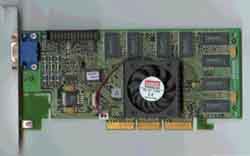The Card
| The Viper V770 Ultra is the first non-reference design TNT2 Ultra card AnandTech has tested. What is so special about a TNT2 Ultra based card that isn't build around NVIDIA's reference design? This opens up a few new pathways that can be beneficial to the buyer in the end. | |
| Not following NVIDIA's reference design can mean that the card is manufactured with a greater quality than the bare minimum standards NVIDIA's reference design cards are expected to meet, or it can mean that the card is considerably worse than your run of the mill TNT2 Ultra card. Which one of those categories does the V770 Ultra fall into? Let's find out. | |
The board is cleanly designed and happens to be very reminiscent of most other Diamond products, including their Savage4 based Stealth III S540 accelerator. The board AnandTech received was outfitted with sixteen 2MB EliteMT 5.5ns 183MHz SDRAM chips, divided into two groups of 8 chips, with one group per side of the board. As with all TNT2 Ultra boards, the V770 Ultra features an active heatsink/fan combo designed to help keep the temperatures of the board to a manageable level. The board features no TV-out port nor does it feature a digital flat panel output port either, an interesting set of absences, but ones worth noting nonetheless.
| The installation of the Viper V770 was by far the easiest out of all of the TNT2 cards AnandTech has tested. The installation CD packaged with the card fired up the classic Diamond installation screen, and the trip from there was very simple. The Viper V770 Ultra features Diamond's new InControl Tools 99, a collection of the best utilities and features Diamond customers have been asking for. It's nice to know that Diamond listens to what the market demands, as the InControl Tools 99 provide an incredible combination of useful features into one excellent utility. |
|
| Diamond realized that there would always be a chance that the owner of a competing TNT2 card would try and install Diamond drivers over their own in order to take advantage of the InControl Tools 99 features, in order to prevent this Diamond took some extra steps to make sure that the V770 Ultra drivers could only be used on a V770 Ultra card. Although this makes sense for Diamond, it prevents the detection of the equivalent reference driver revision which the V770 Ultra drivers are based on. Judging by the performance/compatibility, you could be lead to assume that the drivers are revision 0173 or maybe a generation or two earlier. | |
| It would be extremely disappointing for Diamond to release a card clocked at 150/183 without any way of manipulating the clock frequency, so Diamond managed to sneak in a nice set of utilities into their InControl Tools 99 driver utility. Creatively enough, Diamond dubbed a set of 5 pre-set overclocked frequencies, the 5 different "Boost Levels" unofficially supported by the Viper V770 Ultra. Upon launching any 3D application or game, a profile is created for that application/game within Diamond's InControl Tools 99 utility. You can modify that profile by selecting different "Boost Levels" which basically allows your card to be clocked at a different frequency depending on what game you run. | |
| Why on earth would you want a feature like that? Well, overclocking can be a tricky thing at times, while running your TNT2 at 175/183 may work just fine in Quake 2, when you fire up Unreal it may lock up after a few minutes. Although that scenario is rare, it does happen. Some games happen to tax the system in different ways than your more conventional Quake 2 engine based games. The ability to independently select a clock speed for each game gives you the tweaking control over your system without having to re-clock your card every time you start a new game. | |













2 Comments
View All Comments
brendamiller - Thursday, January 23, 2020 - link
The Viper V770 Ultra was first of its kind that was introduced several years ago and it set a new trend in their field. I trust only on https://essayyoda.com/review-of-edubirdie-com/ source to read reviews of different online writing service providers. I have also used these NVIDIA's manufactured cards because they were providing great quality.ozzuneoj86 - Tuesday, January 12, 2021 - link
Posting here at a review of Nvidia's first "Ultra" card, in January of 2021, wondering if rumors of nvidia releasing a GTX 3060 Ultra are true. Hard to even fathom the performance difference between what was considered "Ultra" in 1999 and what is considered "Ultra" in 2021.Nearly 1000x the Texel fillrate, 200x the memory bandwidth... and we won't even talk about trying to measure FLOPs on a graphics card in 1999.
And this rumored "Ultra" is a mid range model.
Astonishing.